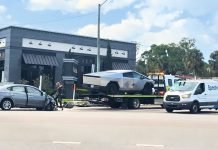Tesla has recently unveiled a clause in their Motor Vehicle Agreement that indicates a strategic move to maintain exclusivity and control over the initial distribution of its much-anticipated Cybertruck. In a bid to temper expectations and manage its production pipeline, Tesla lays out a clear message: new owners are prohibited from reselling the Cybertruck within the first year of delivery.

Tesla Cybertruck Owners Strict Resale Restriction
Tesla Cybertruck Motor Vehicle Agreement outlines a critical clause that prohibits owners from reselling their vehicles within the first year of ownership. This restriction is a non-standard approach in the automotive industry, especially among mass-produced vehicles, but it is not unprecedented in the context of high-demand, limited-release models. The policy is a clear indicator of Tesla’s intention to control the secondary market for its vehicles and protect the Cybertruck’s brand value.
The clause stipulates that owners wishing to sell their Cybertruck within the first year must first offer it back to Tesla. The owner is required to notify Tesla in writing and give the company the option to purchase the vehicle back. The buy-back price is determined by the initial Final Price Sheet, with deductions for mileage, wear and tear, and any necessary refurbishments to meet Tesla’s used vehicle standards. This ensures that Tesla has the first right of refusal and maintains a degree of market control.
If Tesla chooses not to repurchase the vehicle, the owner is then permitted to sell it to a third party, but only after obtaining written consent from Tesla. This stipulation adds another layer of control for Tesla, allowing them to vet potential buyers and ensure that the vehicle is sold under conditions favorable to the company’s interests.
Implications for Owners and Potential Buyers
The no-resale clause may have several implications for both current owners and prospective buyers:
- Market Exclusivity: By preventing early resale, Tesla ensures that the Cybertruck remains exclusive, potentially keeping demand and pricing high.
- Owner Commitment: This clause may deter speculative buyers who are looking to make a quick profit from flipping the vehicle, ensuring that only serious buyers commit to purchasing.
- Consumer Sentiment: Some consumers might view this policy as overly restrictive, which could affect their purchasing decision. However, for enthusiasts and brand loyalists, it could also enhance the vehicle’s desirability as a collector’s item.
- Resale Value Stability: The resale market for the Cybertruck is likely to be more stable since a sudden influx of vehicles for sale within the first year will be avoided.
Reason Behind the Re-sale Restriction
Elon Musk has been transparent about the challenges Tesla faces in scaling up production for the Cybertruck. His comments suggest a cautious approach, emphasizing the complexity and novelty of manufacturing such an innovative product. Musk has stated that the production of the Cybertruck would be “extremely difficult” due to its unique design and features, which lack precedents in the automotive industry. This complexity necessitates a slower, more deliberate production ramp to ensure quality and to address unforeseen issues that may arise with such a groundbreaking vehicle.
CYBERTRUCK ORDER AGREEMENT!
You can’t sell Cybertruck within the first year.“You understand and acknowledge that the Cybertruck will first be released in limited quantity. You agree that you will not sell or otherwise attempt to sell the Vehicle within the first year following… pic.twitter.com/oul2WjTgdT
— Nic Cruz Patane (@niccruzpatane) November 11, 2023
The introduction of the no-resale clause correlates with Tesla’s strategy of releasing the Cybertruck in limited quantities initially. Limited release is a common practice for high-demand products, but it’s particularly pertinent for Tesla, which anticipates a gradual increase in production capabilities. By controlling the number of vehicles in circulation, Tesla can better manage customer expectations and quality control, ensuring that each unit meets the company’s high standards.
Controlling the initial distribution of the Cybertruck is strategic for Tesla for several reasons. First, it allows Tesla to build a solid foundation of brand enthusiasts who are more likely to provide valuable feedback and serve as brand ambassadors. Second, it helps prevent a secondary market from overshadowing the primary market, which could potentially harm Tesla’s brand value and pricing structure.
Finally, this control mechanism can also protect Tesla from the reputational risks associated with an uncontrolled release, such as widespread dissatisfaction if the vehicle doesn’t meet the high expectations set by the brand.
Final Thoughts
This move could have various implications for the market. On one hand, it could strengthen brand loyalty and maintain price stability. On the other, it might frustrate consumers looking to capitalize on the initial hype. However, given Musk’s statements during the Q3 earnings call, it seems that this approach is a necessary step to navigate the “extremely difficult” path towards innovation.
Tesla’s directive is a calculated step to safeguard the brand’s vision for the Cybertruck and its market position. While this may impose certain restrictions on early adopters, it reflects Tesla’s commitment to a long-term strategy over immediate gains. The success of this policy will likely be measured by its ability to maintain the Cybertruck’s allure and Tesla’s ability to meet its ambitious production goals in the coming years.


















